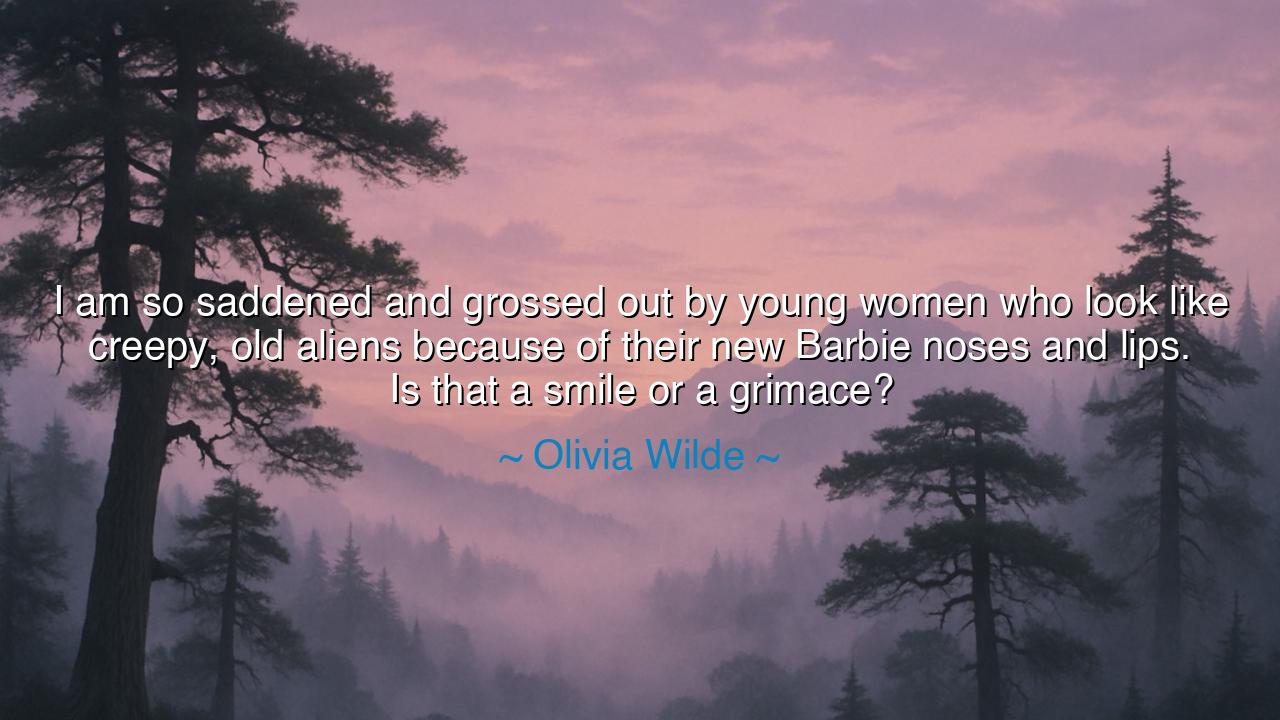
I am so saddened and grossed out by young women who look like
I am so saddened and grossed out by young women who look like creepy, old aliens because of their new Barbie noses and lips. Is that a smile or a grimace?






The words of Olivia Wilde fall like a cry of both sorrow and warning: “I am so saddened and grossed out by young women who look like creepy, old aliens because of their new Barbie noses and lips. Is that a smile or a grimace?” Beneath their sharpness lies not cruelty, but lament—a grief for beauty lost in the pursuit of false perfection, and for joy stolen by the weight of artificial expectation.
The heart of this teaching is the distortion of the smile, that ancient emblem of joy, kindness, and humanity. Wilde’s words reveal how what was once natural and radiant can, through excess and vanity, be twisted into something hollow—no longer a true expression of life, but a mask. The question she asks, “Is that a smile or a grimace?” pierces deeper than appearance; it asks whether the pursuit of outward approval has consumed the inward soul, leaving only a shadow where authenticity once dwelled.
The ancients, too, warned of such dangers. In the myths of Narcissus, the youth who gazed so long upon his reflection that he wasted away, we see the same tragedy: beauty turned inward becomes destruction. What should inspire life becomes obsession, and what should bring joy becomes torment. Wilde’s lament echoes this eternal tale, for in her time the mirror is no longer water, but the surgeon’s knife, the promise of transformation that too often steals the very essence it seeks to perfect.
And yet, her words are not only condemnation—they are sorrow. She says she is saddened, because she perceives the deeper wound: that these women are not villains, but victims of a culture that worships the plastic idol of Barbie beauty, that confuses youth with worth, perfection with love. Their altered faces are not triumphs, but cries for acceptance, for recognition, for belonging in a world that teaches them to trade authenticity for approval.
History shows us other times when fashion or vanity led to distortion. In ancient China, the practice of foot-binding sought to make women’s feet small, for beauty and status. Yet what began as elegance became deformity, crippling generations. In the same way, the endless pursuit of sculpted noses, swollen lips, and “eternal smiles” threatens to cripple the spirit of a new generation—not in their bones, but in their very sense of self. Wilde’s words echo across centuries: beware the beauty that destroys.
The lesson is clear: true beauty is not in mimicry, but in authenticity. A genuine smile, born from the heart, is more radiant than any sculpted face. To lose the ability to smile naturally, to grimace in the pursuit of beauty, is to surrender the very thing that makes us human. The task, then, is not to chase perfection, but to embrace imperfection with grace, to honor the unique features that speak of individuality and life’s journey.
Therefore, let us act with wisdom. Let us teach ourselves and others to cherish the smile that is real, the one that lights the eyes and softens the spirit. Let us resist the false idols of image and remember that what endures is not flawless skin, but the warmth we carry into the world. For in the end, when others remember us, it will not be for a nose or lips, but for the joy we brought, the laughter we shared, and the love we gave.
Carry forward Olivia Wilde’s wisdom: “Is that a smile or a grimace?” Let it remind you always to guard the authenticity of your own expression, and to choose truth over illusion. For only the real smile—the one unforced, unaltered, unashamed—has the power to light the darkness of another’s heart.






AAdministratorAdministrator
Welcome, honored guests. Please leave a comment, we will respond soon